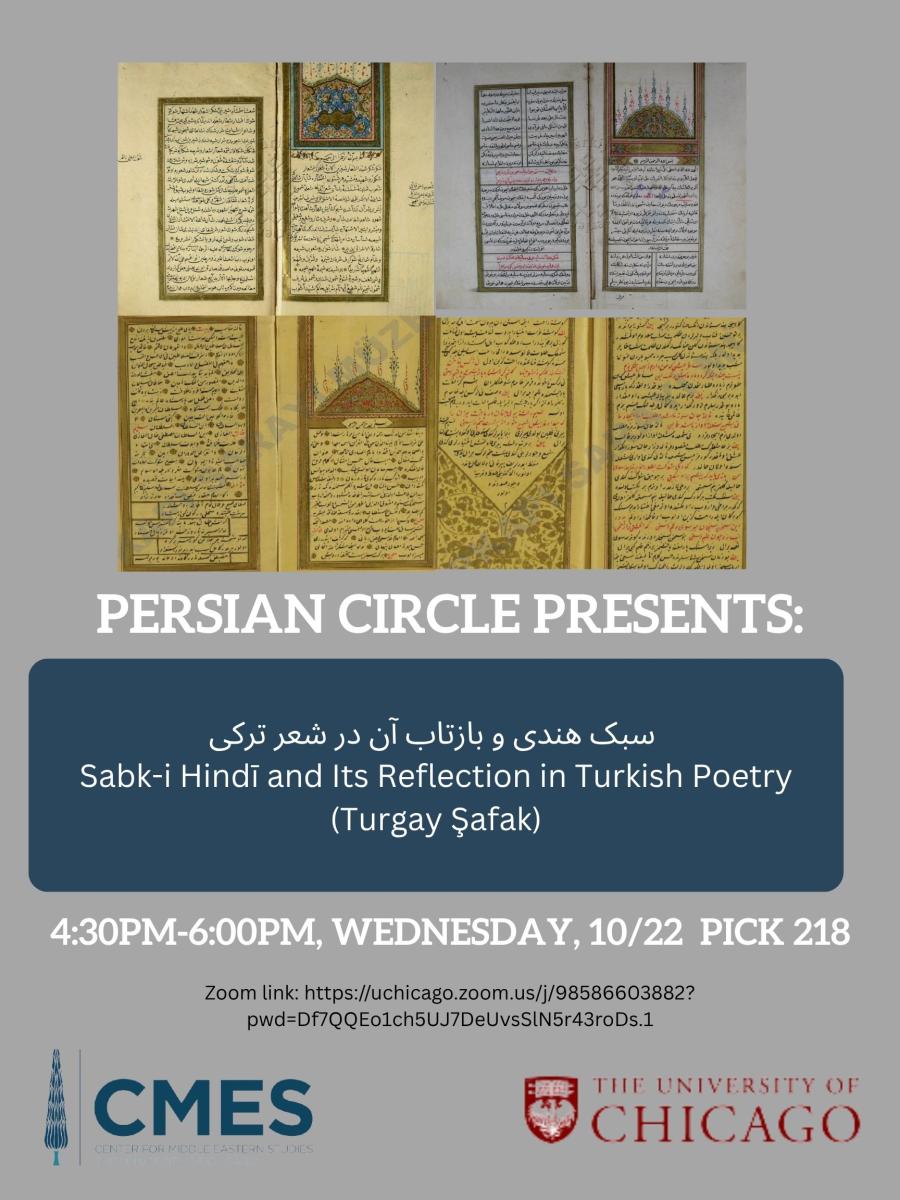Please join us on Wednesday, October 22nd, at 4:30 pm, in Pick 218 for a presentation by Turgay Şafak titled “Sabk-i Hindī and Its Reflection in Turkish Poetry."
Join Zoom Meeting
https://uchicago.zoom.us/j/98586603882?pwd=Df7QQEo1ch5UJ7DeUvsSlN5r43roDs.1
Meeting ID: 985 8660 3882
Passcode: 557618
چکیده
در دوره امپراطوری عثمانی شاعران ترک به خاطر محیط ادبی و آموزش زبان، فارسی را به خوبی می دانستند و شعر فارسی می سرودند. در زمان عثمانیان، شاعران ترک زبان دیوان و دیوانچه های فارسی به وجود آوردند. آثاری مانند مثنوی، دیوان حافظ، گلستان و بوستان سعدی بارها از طرف شارحان عثمانی ترجمه و شرح شده اند. از بین شرح هایی که از طرف شعرا و علمای عثمانی انجام شده است، شرح مثنوی آنقروی و شرح سودی بسنوی بر دیوان حافظ است که به فارسی نیز ترجمه شده است
این علاقه در دوره به اصطلاح «سبک هندی» هم ادامه داشت. در این دوره، ادیبان عثمانی به شاعرانی مثل صائب تبریزی، عرفی شیرازی و شوکت بخارایی علاقه زیادی پیدا کردند. همچنین، برخی شاعران عثمانی اشعاری به سبک هندی سرودند. این شاعران نیز از شاعران سبک هندی فارسی پیروی کردند
در این نشست، به شرح هایی که بر دیوان صائب تبریزی و شوکت بخارایی و عرفی شیرازی نوشته شده، و نیز شرح هایی که بر دیوان شاعران عثمانی که اشعاری به سبک هندی سرودند، می پردازیم
Abstract
Turkish-speaking poets, due to the literary environment and the education they received in the Persian language, possessed an excellent command of Persian during the Ottoman period. Some poets even produced dīvāns and dīvānchehs in this language. Furthermore, the classics of Persian literature, such as Rumi’s Masnavi, Hafez’s Divan, and Saʿdi’s Gulistan and Bustan, were repeatedly commented upon and translated several times by Ottoman scholars and poets. Among these commentaries, Anqaravi’s commentary on the Masnavi and Sudi Bosnavi’s commentary on Hafez were even translated into Persian. This literary interest continued well into the so-called Sabk-i Hindī period. Ottoman poets and men of letters in this era developed a particular fascination with poets such as Ṣāʾib-i Tabrīzī, ʿUrfī-yi Shīrāzī, and Shawkat-i Bukhārāʾī. Some Ottoman poets also composed poems in Sabk-i Hindī, following the models of these Persian poets.
This talk will explore both the commentaries written on the dīvāns of Ṣāʾib-i Tabrīzī, Shawkat-i Bukhārāʾī, and ʿUrfī-yi Shīrāzī, as well as the Ottoman poets who composed poetry in Sabk-i Hindī.
Turgay Şafak completed his undergraduate studies in the Department of Librarianship at Istanbul University. He received his master’s and doctoral degrees in Persian Language and Literature from the Faculty of Literature and Humanities at the University of Tehran. Between 2016 and 2018, he served as the director of the Yunus Emre Institute in Tehran. He is currently a faculty member in the Department of Persian Language and Literature at Istanbul Medeniyet University. His doctoral dissertation is a critical edition of the Dīvān of Shavkat Bukhārāʾī. Şafak conducted various studies in different fields of Persian literature, and in recent years, his research has mainly focused on translations and commentaries of Persian poets’ works in the Ottoman realm. He has also translated several books from Persian into modern Turkish.
We look forward to seeing you all!
سلام بر همگی
لطفاً این چهارشنبه، ساعت ۱۶:۳۰، برای سخنرانی تورقای شفق با عنوان «سبک هندی و بازتاب آن در شعر ترکی» با ما همراه باشید
این برنامه در اتاق شماره ۲۱۸ ساختمان "پیک" دانشگاه شیکاگو بر گزار خواهد شد
در انتظار حضورتان هستیم
به امید دیدار
تورقای شفق دوره کارشناسی خود را در دانشکده ادبیات دانشگاه استانبول، در رشته کتابداری به پایان رسانده است. و نیز دوره های کارشناسی ارشد و دکتری خود را در دانشکده ادبیات و علوم انسانی دانشگاه تهران، رشته زبان و ادبیات فارسی گذرانده است. در سال های ۲۰۱۶ تا ۲۰۱۸ به عنوان رئیس مؤسسه یونس امره در تهران فعالیت داشته است. او در حال حاضر، عضو هیئت علمی گروه زبان و ادبیات فارسی، دانشکده زبان ها و ادبیات شرقی دانشگاه مدنیت استانبول است
پایان نامه دکتری وی تصحیح انتقادی دیوان شوکت بخارایی است. وی همچنینپژوهش های گوناگونی در زمینه های مختلف ادبیات فارسی انجام داده است. در سال های اخیر، بیشتر در مورد ترجمه و شرح های ادبیات فارسی در سرزمین عثمانی تحقیق می کند
شفق، کتاب های مختلفی از فارسی به ترکی استانبولی ترجمه کرده است

